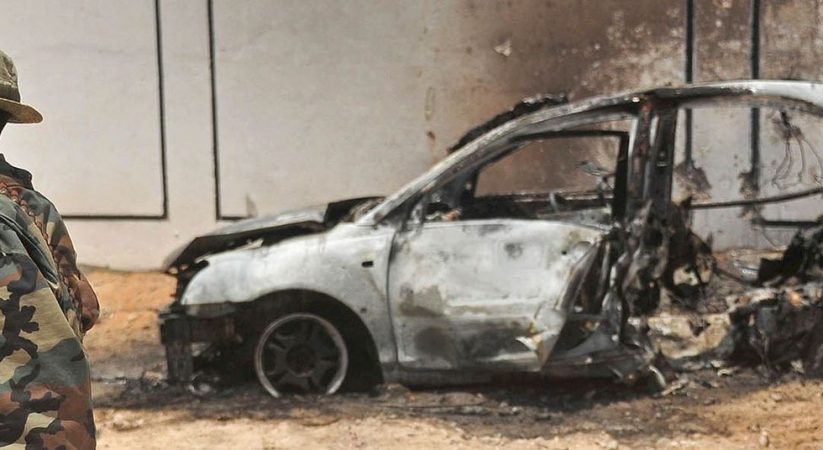
U.S. sends troops to train, approves expanded military role
Nation at war for three decades is battling al-Qaeda affiliate
Bloomberg | by Felix Njini and Nizar Manek | Almost a quarter century since the U.S. withdrew from Somalia after militiamen shot down two Black Hawk helicopters and special forces took heavy losses in a battle in the capital, an al-Qaeda-backed insurgency is once again drawing U.S. attention.
The U.S., which already supported the Horn of Africa country’s battle against al-Shabaab militants with drone strikes and limited special forces, say it’s deploying about a dozen troops from the 101st Airborne Division to train Somalia’s army and has given U.S. commanders greater authority to use air strikes. A Navy SEAL was killed May 4 in a operation with Somali forces west of the capital, Mogadishu. The Pentagon said it was the first death of a U.S. service member in combat in Somalia since 1993.
President Donald Trump has given “enhanced authorities in the last several weeks” to strike al-Shabaab, General Thomas Waldhauser, who heads U.S. Africa Command, told reporters last month at Camp Lemonnier, a U.S. military base in neighboring Djibouti. “We continue to develop intelligence and develop targets. And when we have the opportunity, we will use those.” He said Somalia’s President Mohamed Abdullahi Mohamed supports the U.S. efforts.
The steps come as Trump says fighting terrorism is his top priority, the U.S. bolsters special forces in Syria and eases restrictions on military action in Yemen. Analysts say adding foreign firepower is unlikely to bring peace to Somalia, a nation wracked by decades of civil war that’s seen three foreign invasions in the past decade.

“Stepping up military engagement is only part of the solution: it won’t address fundamental problems,” said Matt Bryden, director of Sahan Research, an institute in neighboring Kenya. “Al-Shabaab is constantly evolving — it adeptly appropriates local social and political grievances — so defeating al-Shabaab requires a focus on engaging the population, not simply going around and killing militants.”
Mogadishu Battle
Somalia descended into conflict with the ousting of dictator Mohamed Siad Barre in 1991, prompting the deployment of a U.S.-led United Nations peacekeeping mission that involved as many as 33,000 multinational troops. The U.S. ended its role after the shooting down of the two helicopters and the deaths of 18 of its troops in Mogadishu in October 1993. Other UN troops pulled out shortly afterward. The incident was recounted in Mark Bowden’s book “Black Hawk Down.”
Al-Shabaab, a splinter group of the Islamic Courts Union that controlled Mogadishu for about six months in 2006, has waged an insurgency ever since, holding parts of southern Somalia and staging suicide attacks that have targeted members of the internationally backed government.
The government has little authority beyond the capital, and while an African Union peacekeeping force, known as Amisom, and Somalia’s army have wrested back towns, al-Shabaab often resumes control once the troops withdraw. The militants swore allegiance to al-Qaeda in 2012.
“Al-Shabaab is a reflection of a political and institutional vacuum,” said Bryden, a former head of the UN Monitoring Group on Somalia and Eritrea. “If we can address that, they will be reduced to little more than a nuisance.”
Drone Strikes
The U.S. has conducted at least 42 drone strikes in Somalia since January 2007, according to data from the Bureau of Investigative Journalism, a London-based media organization that has tracked the U.S.’s use of the unmanned aircraft in four countries. Some strikes have killed senior al-Shabaab officials, including former leader Ahmed Abdi Godane and intelligence chief Abdishakur Tahliil.
Andrew S.E. Erickson, a former U.S. State Department adviser for the Horn of Africa, said by email that greater authority to identify and address al-Shabaab threats “actually makes everybody safer, as previous restrictions hampered effective response.”
Hussein Arab Issa, chairman of Somalia’s Defence Parliamentary Committee, didn’t respond to emailed requests for comment.
The dozen 101st Airborne Division troops will train Somalia’s army on “basic logistical operations” and allow them “to better fight al-Shabaab,” Africom spokeswoman Jennifer Dyrcz said in an emailed response to questions.
U.S. advisers and technical experts are always on the ground in Somalia, said Ibrahim Ali, a former chief of intelligence in Puntland, a semi-autonomous northern territory where al-Shabaab and Islamic State are present. He and the agency’s former foreign liaison, Mohamed Muse Abdule, said that one of the largest U.S. bases in Somalia is at a southern airfield. Africom said there are no U.S. bases in the country.
National Army
Somalia’s “army still operates more like a collection of militias than a national army — if you remove Amisom from the scene, the army is probably not even capable of holding Mogadishu,” said Bryden.
Amisom “can provide space for Somali governing institutions and security forces to grow, but ultimately the solution will be largely political: we should be pushing for political and social inclusion to diminish the space for al-Shabaab,” while empowering Somali forces to do the rest, he said.
Somalia’s neighbors Kenya, Ethiopia and Djibouti as well as Uganda and Burundi contribute troops to a 22,000-strong Amisom force. Kenya and Uganda have signaled they’ll withdraw their forces in the next two years.
The Heritage Institute, a Mogadishu-based think tank, said in an April report that Somalia’s government “must understand that brute force alone cannot secure peace.”
Mohamed’s administration “should seriously explore and strategize on how to bring al-Shabaab to the negotiating table,” it said.
.
.
________________________________
_____________________________________________________________________________________
Xafiiska Wararka Qaranimo Online | Mogadishu, Somalia
_____________________________________________________________________________________Advertisement
_____________________________________________________________________________________ _____________________________________________________________________________________
_____________________________________________________________________________________
 _____________________________________________________________________________________
_____________________________________________________________________________________






